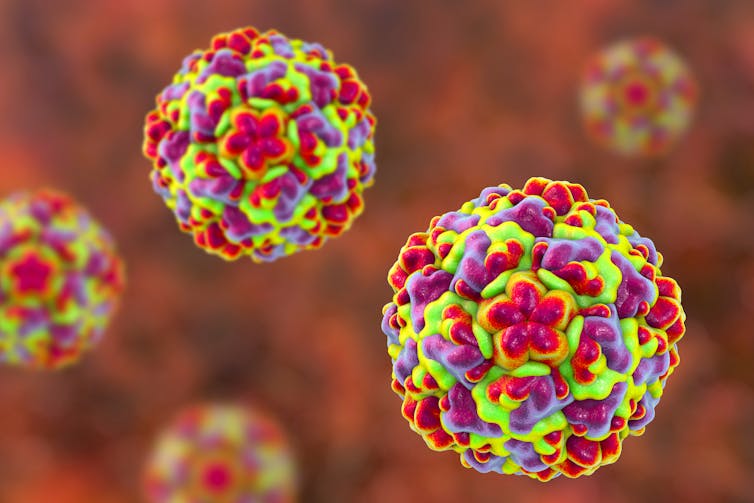Genellikle viral enfeksiyonların, bireysel virüs türlerinden kaynaklandığını varsayıyoruz. Ancak gerçekte, her gün birçok virüse maruz kalıyoruz ve eş-enfeksiyon - birine aynı anda iki veya daha fazla virüs türü bulaştığında - oldukça yaygındır.
Boğazımızı ve alt solunum yollarını kaplayan hücreler çevremizdeki ortama maruz kalır ve bu da onları solunum virüsleri tarafından ortak enfeksiyon için birincil hedef haline getirir. Bunlar, soğuk algınlığına neden olan rinovirüslerden, genellikle küresel pandemilerin nedeni olan daha ciddi grip virüslerine kadar uzanır.
Ortak enfeksiyonun en sık karşılaşılan sonuçlarından biri, bir virüsün rekabetten üstün olduğu ve diğer birlikte bulaşan virüslerin kopyalanmasını baskıladığı bir fenomen olan viral girişimdir . İlginç bir şekilde artan sayıda kanıt, rinovirüslerin daha ciddi olma eğiliminde olan diğer solunum yolu virüslerinin kopyalanmasına müdahale edebileceğini öne sürüyor. Hatta ev sahibine onlardan geçici koruma bile sunabilirler.
İyi haber şu ki, bu, COVID-19'dan sorumlu virüs olan SARS-CoV-2'yi içeriyor gibi görünüyor. Gelen yeni bir araştırmaya , rınovıruslerı bu virüsün çoğalmasını bastırmak için gösterilmiştir.
Rinovirüsler
İnsanları enfekte eden solunum yolu virüslerinin çoğu rinovirüslerdir (Yunanca "burun" için "gergedan" dan). İlk olarak 1953'te tanımlanan rinovirüsler, tüm dünyada mevcut olan son derece küçük solunum yolu virüsleridir. Bildiğimiz kadarıyla, onlar sadece insanları enfekte edebilirler.
Rinovirüs enfeksiyonları bazı durumlarda ciddi olabilir. Bununla birlikte, genellikle bize, nispeten hafif bir hastalık olan soğuk algınlığına neden olmak için enfekte olurlar. Böyle bir enfeksiyona yanıt olarak, bağışıklık sistemimiz interferon adı verilen virüs öldürücü moleküller üretir.
İnterferonlar, tüm virüs türlerinin enfeksiyonlarına yanıt olarak üretilir, ancak diğer solunum virüslerine kıyasla rinovirüse yanıt olarak çok daha hızlı ve daha büyük miktarlarda üretilirler . Buna rağmen rinovirüsler, interferonlardan kaçmalarına ve verimli bir şekilde çoğalmalarına izin veren karmaşık mekanizmalar geliştirmişlerdir. Rinovirüsün neden olduğu interferon tepkisinin, virüsün kendisinden ziyade soğuk algınlığı semptomlarına neden olduğu yaygın olarak kabul edilmektedir .

Rinovirüsler interferonlara oldukça dirençli iken, diğer bazı solunum yolu virüsleri bunlara aşırı duyarlıdır. Örneğin grip virüsleri, interferonların varlığında düzgün şekilde çoğalamaz.
Rinovirüs enfeksiyonları böylesine büyük bir interferon tepkisini tetiklediğinden, araştırmacılar grip gibi daha ölümcül, interferona duyarlı virüsler tarafından enfeksiyona karşı koruma sağlayabilecekleri fikrine sahiplerdi.
Son yıllarda, birkaç araştırma grubu bu fenomeni laboratuvarda araştırdı. Hücrelere rinovirüs bulaştığında, bunun influenza virüsü ile enfekte olmalarını önleyen bir interferon tepkisini tetiklediğini buldular .
Rinovirüs enfeksiyonları diğer solunum yolu virüslerinin çoğalmasını engellerse, bu onların yayılmasını ve dağılım modellerini etkileyebilir. Örneğin kanıtlar, rinovirüsün 2009 küresel salgını sırasında H1N1 veya "domuz gribi" influenza virüsünün yayılmasını kesintiye uğratmış olabileceğini gösteriyor .
Soğuk ve COVID-19
Rinovirüs enfeksiyonları, pandemik influenza virüslerinin çoğalmasına ve yayılmasına müdahale edebilirse, SARS-CoV-2 gibi interferona duyarlı koronavirüsler için de aynısını yapabilir mi?
Glasgow Üniversitesi'nden bir grup bilim insanı kısa süre önce bu soruyu yanıtlamak için yola çıktı. İnsan solunum yolundaki koşulları kopyalayan laboratuvarda yetiştirilen hücre katmanlarını rinovirüs, SARS-CoV-2 ve her iki virüsle aynı anda enfekte ettiler.
İlginç bir şekilde, SARS-CoV-2, ortak enfeksiyon senaryosunda çok daha yavaş çoğaldı. Ancak SARS-CoV-2 varlığında veya yokluğunda rinovirüs replikasyonu değişmedi.
Yazarlar, gerçek yaşam koşullarını daha iyi kopyalamak için, hücreleri diğer virüsle birlikte enfekte etmeden 24 saat önce ya rinovirüs ya da SARS-CoV-2 ile enfekte ettiler. Rinovirüs, SARS-CoV-2'den önce veya sonra eklenip eklenmediğine bakılmaksızın SARS-CoV-2 replikasyonunu bastırabildi, bu da rinovirüs enfeksiyonunun hücreleri SARS-CoV-2'den aktif olarak koruduğunu gösteriyor.
Daha sonra yazarlar, SARS-CoV-2 replikasyonu üzerindeki inhibitör etkinin spesifik olarak rinovirüs kaynaklı interferon yanıtından kaynaklandığını doğrulamak istediler. BX795 adı verilen interferonların virüs öldürme özelliklerini bloke eden bir ilaç varlığında hücreleri hem rinovirüs hem de SARS-CoV-2 ile birlikte enfekte ettiler.
Deneyin bu bölümünde, BX795, SARS-CoV-2'nin tek bir SARS-CoV-2 enfeksiyonu ile karşılaştırılabilir bir seviyede çoğalmasına izin verdi. Bu, rinovirüs kaynaklı interferon yanıtının, BX795 içermeyen ko-enfeksiyon deneylerinde görülen SARS-CoV-2 replikasyonundaki bloktan gerçekten sorumlu olduğunu doğruladı.
Yazarlar, matematiksel simülasyonları kullanarak, popülasyonda daha sık görülen rinovirüs enfeksiyonlarının, SARS-CoV-2 enfeksiyonu oranının azalmasına neden olacağını da buldular. Birlikte ele alındığında, bu sonuçlar rinovirüs enfeksiyonlarının SARS-CoV-2 replikasyonunu bastırdığını ve bunun da popülasyondaki yeni vaka sayısını azaltabileceğini doğrulamaktadır.
Öyleyse rinovirüsler bizi SARS-CoV-2 enfeksiyonundan koruyabilir mi? Kısa cevap evet. Bununla birlikte, rinovirüs kaynaklı interferon yanıtının, doğuştan gelen bir bağışıklık örneği olduğuna dikkat etmek önemlidir, bu da etkisinin yalnızca istilacı rinovirüs vücudunuzda olduğu sürece devam ettiği anlamına gelir.
Soğuk algınlığından kurtulursanız ve bir hafta sonra SARS-CoV-2 ile temas ederseniz, SARS-CoV-2 enfeksiyonunu başarılı bir şekilde engellemek için yeterli interferona sahip olmanız olası değildir. Oldukça spesifik antikorların üretimini içeren uzun vadeli bağışıklık, yalnızca söz konusu virüsle - ya doğada ya da aşılama yoluyla - doğrudan temasa geçilerek elde edilir.
Dolayısıyla, henüz COVID-19 geçirmemiş veya aşılanmamış biriyseniz, yalnızca soğuk algınlığı yaşarken aynı zamanda enfekte olacak kadar şanslıysanız korunursunuz. Rinovirüsler, SARS-CoV-2'nin insan popülasyonu arasında yayılmasını kontrol etmede kritik bir rol oynayabilir. Bununla birlikte, en etkili yol muhtemelen aşı olmaya devam etmektedir.
The common cold might protect you from coronavirus – here's how

We often assume that viral infections are caused by individual virus types. But in reality, we’re exposed to many viruses on a day to day basis, and co-infection – where someone is simultaneously infected by two or more virus types – is quite common.
The cells lining our throat and lower airways are exposed to the environment around us, making them a prime target for co-infection by respiratory viruses. These range from common-cold-causing rhinoviruses to the more serious influenza viruses, which are often the cause of global pandemics.
One of the most frequent outcomes of co-infection is viral interference, a phenomenon where one virus out-competes and suppresses the replication of the other co-infecting viruses. Interestingly, a growing body of evidence suggests rhinoviruses may interfere with the replication of other respiratory viruses that tend to be more serious. They may even offer the host temporary protection from them.
The good news is that this appears to include SARS-CoV-2 – the virus responsible for COVID-19. In a new study, rhinoviruses have been shown to suppress the replication of this virus.
Rhinoviruses
The majority of respiratory viruses that infect humans are rhinoviruses (from the Greek “rhino” for “of the nose”). First identified in 1953, rhinoviruses are extremely small respiratory viruses that are present all over the world. As far as we know, they are only capable of infecting humans.
Rhinovirus infections can be serious in some cases. However, they usually infect us to cause the common cold, a relatively mild disease. In response to such an infection, our immune system produces virus-killing molecules called interferons.
Interferons are produced in response to infections by all types of viruses, but they’re produced much faster and in greater quantities in response to rhinovirus compared to other respiratory viruses. Despite this, rhinoviruses have evolved complex mechanisms that allow them to evade interferons and replicate efficiently. It’s widely accepted that the rhinovirus-induced interferon response is what produces the symptoms of the common cold, rather than the virus itself.

While rhinoviruses are pretty resistant to interferons, some other respiratory viruses are extremely sensitive to them. Influenza viruses, for example, can’t replicate properly in the presence of interferons.
Since rhinovirus infections trigger such a huge interferon response, researchers had the idea that they might offer protection against infection by more deadly, interferon-sensitive viruses, such as influenza.
In recent years, several research groups have investigated this phenomenon in the lab. They found that when cells are infected with rhinovirus, it triggers an interferon response which prevents them from being infected with the influenza virus.
If rhinovirus infections block the replication of other respiratory viruses, this could affect their spread and patterns of distribution. For instance, evidence suggests that rhinovirus may have interrupted the spread of the H1N1, or “swine flu”, influenza virus during the 2009 global pandemic.
The cold and COVID-19
If rhinovirus infections can interfere with the replication and spread of pandemic influenza viruses, could it do the same for interferon-sensitive coronaviruses, such as SARS-CoV-2?
A team of scientists at the University of Glasgow recently set out to answer this question. They infected lab-grown layers of cells that replicates the conditions in the human respiratory tract with rhinovirus, SARS-CoV-2 and both viruses simultaneously.
Interestingly, SARS-CoV-2 replicated much slower in the co-infection scenario. But rhinovirus replication didn’t change in the presence or absence of SARS-CoV-2.
To better replicate real-life conditions, the authors also infected the cells with either rhinovirus or SARS-CoV-2 24 hours prior to co-infecting them with the other virus. Rhinovirus was able to suppress the replication of SARS-CoV-2 regardless of whether it was added before or after SARS-CoV-2, suggesting that rhinovirus infection actively protects the cells from SARS-CoV-2.
Next, the authors wanted to confirm that the inhibitory effect on SARS-CoV-2 replication was specifically caused by a rhinovirus-induced interferon response. They co-infected cells with both rhinovirus and SARS-CoV-2 in the presence of a drug which blocks the virus-killing properties of interferons, called BX795.
In this part of the experiment, BX795 allowed SARS-CoV-2 to replicate at a level comparable to that of a single SARS-CoV-2 infection. This confirmed that a rhinovirus-induced interferon response is indeed responsible for the block in SARS-CoV-2 replication seen in the co-infection experiments without BX795.
Using mathematical simulations, the authors also found that more frequent rhinovirus infections among the population would result in a reduced rate of SARS-CoV-2 infection. Taken together, these results confirm that rhinovirus infections suppress the replication of SARS-CoV-2, which may in turn reduce the number of new cases among the population.
Read more: The end of the pandemic is coming – just don't set a date for the party
So, can rhinoviruses protect us from infection by SARS-CoV-2? The short answer is yes. However, it’s essential to note that the rhinovirus-induced interferon response is an example of innate immunity, meaning that its effect only lasts as long as the invading rhinovirus is in your body.
If you recover from a cold and then come into contact with SARS-CoV-2 a week later, it’s unlikely you will have enough interferons to successfully block the SARS-CoV-2 infection. Long-term immunity, which involves the production of highly specific antibodies, is only obtained by coming into direct contact with the virus in question – either in the wild or by vaccination.
So, if you’re someone who has not yet had COVID-19 or are unvaccinated, you’ll only be protected if you are lucky enough to be infected at the same time that you’re experiencing a cold. Rhinoviruses may play a critical role in controlling the spread of SARS-CoV-2 among the human population. The most effective way, however, probably remains vaccination.![]()
Matthew James, Research Assistant, Wellcome-Wolfson Institute for Experimental Medicine, Queen's University Belfast
This article is republished from The Conversation under a Creative Commons license. Read the original article.








